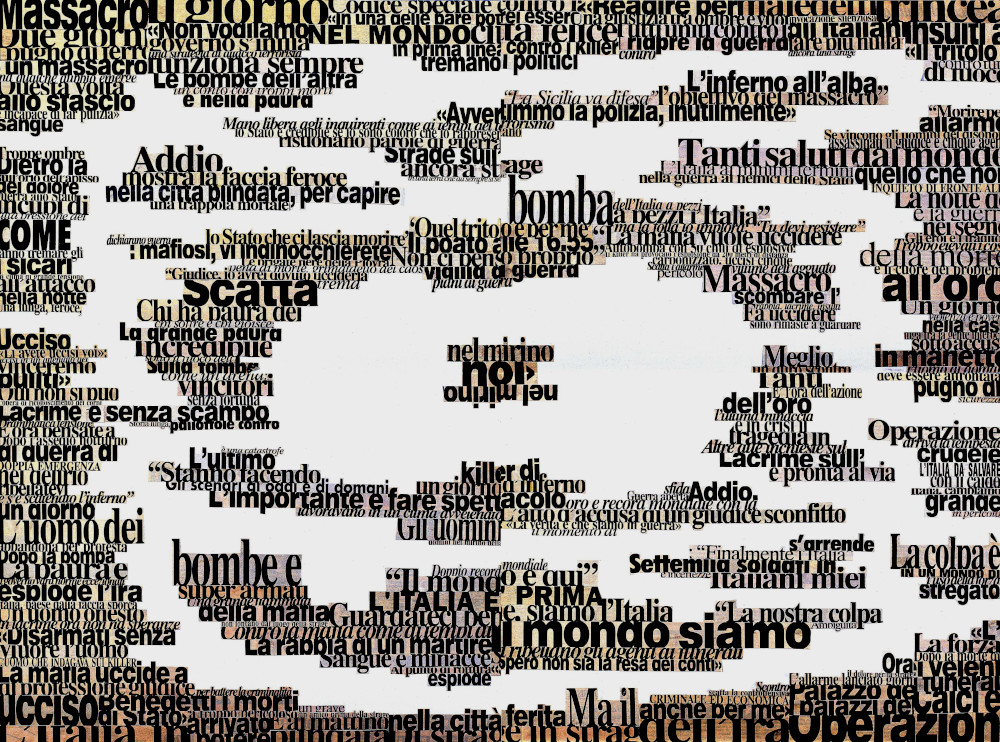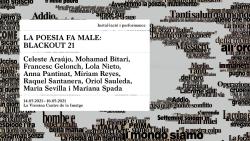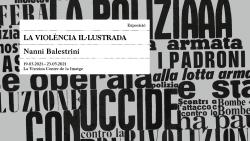La poesia fa male
Celeste Araújo, Mohamad Bitari, Francesc Gelonch, Lola Nieto, Anna Pantinat, Míriam Reyes, Raquel Santanera, Oriol Sauleda, Maria Sevilla i Mariana Spada
22.03.2021 – 16.05.2021
This show constitutes the first Spanish exhibition featuring the artistic, political and publishing career of Nanni Balestrini (Milan, 1935 – Rome, 2019), presented in a comprehensive itinerary. Balestrini was one of the most relevant Italian intellectuals to emerge in the 1960s, and was one of the most firmly committed to the processes of aesthetic and ideological dissidence taking place in Italy in the period.
Balestrini renounces all presumed and imposed linearity for a text, reutilising the words and breaking open the meanings, not just to illustrate the related violence but creating a new form of it, a violence of its own: La poesia fa male [Poetry Hurts]. This would end up being the title used by Balestrini for two different works: a collage and a collection of satirical poems that distil his poetics, turning poetry into a whip made to lash away in the reader’s brain.
Under the revived title La poesia fa male [Poetry Hurts], and in line with Balestrini’s invitation in the letter addressed to readers opening the poetry book Blackout (“Dear peaceful and unexpert reader, the pages you are about to read are an explicit and urgent invitation to violence”), La Virreina Centre de la Imatge has invited ten poets with understanding of experimentation in image, music and words to graft into Balestrini’s poetic and visual work. Four work sessions over the month of March will give way to a festival in May 2021, with performances, talks and recitals related to the figure of Nanni Balestrini.
CELESTE ARAÚJO
Braga, 1979 is a researcher and film programmer. A member of the programming team of Xcèntric, the cinema of the CCCB, she is writing a doctoral thesis on Luigi Nono. She studied Social Communication at the Universidade do Minho and Advanced Studies in Philosophy at the University of Barcelona. She has worked as a journalist for Público (Portugal) and is the editor of Blogs&Docs, where she coordinated the section “Fugas”. She has also published texts in Musik im Metrum der Macht, Arte y políticas de identidad, Els Peus d’Ícar, Archivos de la Filmoteca de Valencia and Cinema Comparat/ive Cinema, amongst others.
MOHAMAD BITARI
Damascus, 1990 is a Palestinian poet, translator, journalist and playwright from Syria, and a political exile in Barcelona. He was born in the Yarmouk Palestinian refugee camp in Damascus, where he went on to study Spanish Philology and Theatre. He has published in various Arab dailies, such as Al-Arabi Al-Jadid, As-safir and the online publication UltraSawt. He has done poetical and cultural translations from Spanish and Catalan to Arabic, including Federico García Lorca, Rafael Alberti, Miguel Hernández, Tomas Cohen and Miquel Martí i Pol. Bitari is the editor of the book of Syrian poetry Jo sóc vosaltres. Sis poetes sirians (Sodepau, Pol·len edicions and Godall Edicions, 2019).
FRANCESC GELONCH
Juneda, 1974 is an art historian, writer, graphic designer and interdisciplinary artist. He has published the poetry book La mandra no és un ocell (LaBreu Edicions,
2016). As a playwright, with Teatre Kaddish he premiered the work Casagemas, directed by Xavier Giménez Casas, which was presented at the Museu Picasso of Barcelona in 2016. His works in experimental cinema have been seen in international festivals.
LOLA NIETO
Barcelona, 1985 has a PhD in Spanish Philology from the University of Barcelona. Together with Antonio F. Rodríguez and Laia López Manrique she coordinates the journal of artistic creation Kokoro and the publishing house Kokoro Libros. She has published Alambres (Kriller71, 2014), Tuscumbia (Harpo libros, 2016) and Vozánica (Harpo libros, 2018).
ANNA PANTINAT
Barcelona, 1977 is a playwright and the author of poetry books such as Construcció de la nit (Fonoll, 2012), De sobte, un estiu (LaBreu, 2014) and Qui no s’anomena (Món de Llibres, 2018). She sings, plays keyboards and the theremin and is a member of the punk band Pentina’t Lula. With Daniel Ardura she runs the music label Repetidor Disc.
MÍRIAM REYES
Orense, 1974 is a poet, videocreator and translator. She experiments with audiovisual writing and multimedia recitals. She has published the poetry books Espejo negro (DVD, 2001), Bella durmiente (finalist of the XIX Hiperión Poetry Prize, Hiperión, 2004), Desalojos (Hiperión, 2008) Yo, interior, cuerpo. Antología poética
(Argentina, 2013), Haz lo que te digo (Bartleby, 2015), Prensado en frío (Malasangre, 2016) and Sardiña (Chan da Pólvora, 2018).
RAQUEL SANTANERA
Manlleu, 1991 is the author of three poetry collections: Teologia poètica d’un sol ús (Viena Edicions, 2015), De robots i màquines o un nou tractat d’alquímia (El Gall Editor, 2018) and Reina de rates. Crònica d’una època (Pagès Editors, 2021). She is one of the three programmers for the l’Horiginal poetry series and the driving force behind Els Vespres Malgastats, in the region of Osona.
ORIOL SAULEDA
Sant Pol de Mar, 1993 creates improvised poetry, without even trying to do so. He has references like the living word of Maragall or the happy new ears of Cage. He has
published the odd book and CD. He does not search for paths: he makes them up, like everyone does.
MARIA SEVILLA
Badalona, 1990 is the author of the poetry collections Dents de polpa (Adia Edicions, 2015), Kalàixnikov (Món de Llibres, 2017) and Plastilina (Fonoll, 2021),
as well as the plaquette if true: false, else: true (Fonoll, 2020). She is writing a doctoral thesis on the novel La passió segons Renée Vivien, by Maria-Mercè Marçal. Her poems have been translated into Spanish, English, Turkish and Croatian. Since 2019 she has been one of the three programmers of l’Horiginal.
MARIANA SPADA
Concepción del Uruguay, Argentina, 1979 has published Ley de conservación (Gog and Magog, 2019). She has lived and worked in Barcelona since 2019.







